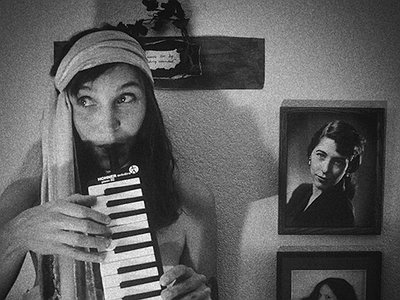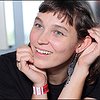Part 1
Name: Evelyn Davis
Nationality: American
Occupation: Teacher/Improvisor/Performer/Composer
Current Release: Guilty Pleasure available on Bandcamp
Recommendations: Psychoacoustic Phenomena in Musical Composition by Maryanne Amacher / The Book of Embraces by Eduardo Galeano / The Lonely Child by Claude Vivier
Read more about Evelyn on her website www.evelyndavis.net
When did you start writing/producing music - and what or who were your early passions and influences? What is it about music and/or sound that drew you to it?
I studied classical piano for almost thirty-four years now. A concert pianist mentor a few years ago used to say, “It’s an apprentice trade” when I’d bitch about being ‘old’. Of course I wrote little classical pieces as a kid, but I feel I can’t call anything writing until I was writing my first jazz charts one of the times I went to college, or maybe even later when I was writing for my first band.
Sound and I have been friends a long time though, from the adoration of the sound of a stick on a wrought iron fence to purposely leaving the radio dial on “the static station”, as I called it.
My grandfather was a jazz pianist in Detroit, and as a 3 or 4 years old tiny person, I’d often steal a couple plastic-encased American cheese slices and wander into the living room to lie under the piano and eat the horrible fake cheese while he practiced. I loved the sound of the resonator box under the piano almost more than its sound in the room or sitting on the bench. I was a weird kid; I don’t recall us ever talking to each other during my slipping into and out of the room, or anyone being particularly concerned where I’d got off to. Ah well, the 80s.
For most artists, originality is first preceded by a phase of learning and, often, emulating others. How would you describe your own development as an artist and the transition towards your own voice? What is the relationship between copying, learning and your own creativity?
To the great and continued annoyance and/or delight of all around me, I’ve always parroted voices, sounds, solos, playing styles of everything I hear. When in jazz school, I transcribed my favourite players, and wrote charts in the style of their charts. When I was in my longest-lived band, I’d hear a vocal performance or a song I considered devastating and write something imitating the way someone placed lyrics, or based on a clever transition or an outro idea, etc.
Every learning environment, school, or tour van, brought change, reaction, and production. What I was drawn to make balanced with what I was able to physically do, and what resources are available to me and that became my voice.
What were your main compositional- and production-challenges in the beginning and how have they changed over time?
Communicating exactly what I sought from other players was by far the biggest challenge from the beginning. Important steps were learning tons of harmonic theory, and how to notate really well, but those things don’t open all the doors. We have to be people folks would like to be in a band with, whose compositions folks would eagerly play.
Knowing what I wanted out of the studio and how to get it felt like a sludgy battle at times and came after recording a lotta records with studio rat bandmates and a smattering of audio engineering study. I
loved the semesters of electronic music I had to take during one of my “college”; they helped me feel comfortable communicating with audio engineers.
What was your first studio like? How and for what reasons has your set-up evolved over the years and what are currently some of the most important pieces of gear for you?
Generally, I simply don’t have the patience or the grace to record even myself, beyond utilitarian idea catching or basic demos. I can answer regarding rehearsal space: a mildew and cat pee-filled basement complete with nearly-70-pound Korg Concert 3000 and a couple unnecessarily large Marshall stacks.
After years of being in bands, I tired of only playing in groups of 3-4 amplified instruments, and ever-more-futile touring during wars and recession. I became kind of a purist for several years, moving a grand piano 8 times up and down to walk up flats and across state lines before finally leaving it with a deserving friend.
Electronic music studies brought me back to synthesis and synthesizers, and these days my primary improv or band gig gear are a Nord electro with an OCD distortion pedal. Here in the Bay Area, we’ve seen a tremendous loss of venues and especially those with acoustic pianos, so I felt I succumbed to pragmatism. I’ve always been rooted in acoustic keyboard instruments, piano, harpsichord even taking pipe organ as a second instrument during one of my stints in school so I am pleased with the simplicity of my gear.
How do you make use of technology? In terms of the feedback mechanism between technology and creativity, what do humans excel at, what do machines excel at?
I use scoring software to notate, and super basic audio processing software (e.g. Audacity) to make occasional videos. I have enjoyed improvising with electronic musicians for many years and I’m always incredibly gratified to hear how well inside piano sounds blend with electronic sounds, whether the artist is working with a circuit-bent Speak & Math or amalgamated samples from several drum machines on a Mac.
Machines are endlessly generative, but at the moment they lack my favourite elements of collaborative music, adaptation, mind reading, reciprocity and human feelings.
Machines aid me to find unknown regions of myself; they are intrinsically self-reflexive and isolating in that sense. In collaboration I search for connection even if it comes with a spectrum of predictable human reactions it’s better than playing in a hall of mirrors.
Production tools, from instruments to complex software environments, contribute to the compositional process. How does this manifest itself in your work? Can you describe the co-authorship between yourself and your tools?
I find it really fascinating how much sound affects human beings, whether they “like” music or not.
I am a different animal in different spaces on different instruments. On a Nord, I might sound like a metal guitarist, on the pipe organ I may only be interested in playing Gubaidulina or Bach or I may just build a drone arc over an hour and a half. Improvising on keys on the piano might bring out the jazz, while inside play could manifest something angelic or something from Saw II.
Once we’re in the late stages of recording a mostly-through-composed song on an album, e.g. tracking vocals, I adore to improvise harmony, or layer harpy sounds, or cold lamp for some processing to react to. Great example of this is “Pentagrams” from the CHIROMANCER record Guilty Pleasure which we released this year. There are also some more mentally ill examples on my solo record, Wit of the Stair, such as “West Won”. Both were recorded and produced by the brilliant Todd Rittmann, of the Shy Diamond studio in Chicago, IL, and of Dead Rider, US Maple, Singer fame (a few of many great projects).
Collaborations can take on many forms. What role do they play in your approach and what are your preferred ways of engaging with other creatives through, for example, file sharing, jamming or just talking about ideas?
Free improvisation has been my default for almost ten years, a predictable crapshoot at its worst and a psychic dimensional shift at its best. If even one person is interested in publicly masturbating, it’s torture. If everybody’s interested in engaging with the other people in the room, it has magic I haven’t seen anywhere else.
So, in some ways I prefer band life, provided there is ample space to improvise and play within structures.
I love talking structure and sounds with other people who are into art or music, and I adore talking music theory. These things can change my entire trajectory if there is reciprocal energy and exchange.






